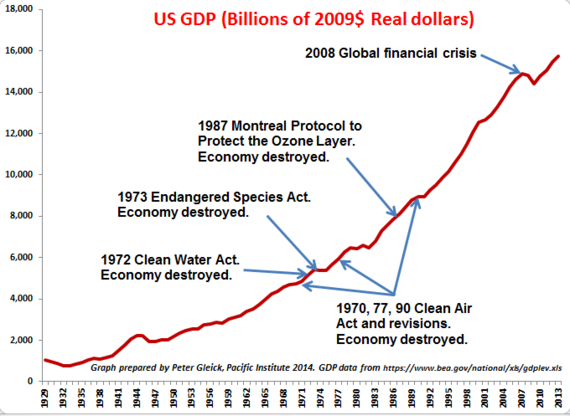If you were wondering how long it would take climate change deniers and industrial polluters to analyze and criticize a new proposal to cut emissions from power plants, this week's historic announcement from the EPA gave us our answer: no time at all. And in one case, the criticism came before the proposal was even issued.
That's what the US Chamber of Commerce decided to do, putting out a data-driven study on the effects of EPA's proposal days before it was released, using the wrong data. The Chamber may have anti-regulation propaganda down to a science, but their doom-and-gloom should still follow the laws of time-and-space. Their claims earned them a rating of four Pinnochios from Washington Post's fact-checkers.
The head of the Chamber, which is heavily supported by coal and oil companies, said that these new EPA standards for power plants would "have a profound effect on the economy, on businesses, and on families."
I agree. Because time and time again, when America sets strong environmental safeguards, the effects are profound. Millions of jobs are created as our innovative spirits rise to the challenge. Millions of Americans are healthier. Our air is cleaner, our water safer.
Of course, none of this is new. In 2009, Congressman Henry Waxman and I built a formidable collation that included the utility industry, unions, consumer and faith-based groups, and many others to pass the Waxman-Markey climate legislation through the U.S. House of Representatives. But the Chamber, with the help of their coal and oil industry boosters, rolled out a lobbying campaign to kill the bill in the Senate using the same inaccurate and misleading tactics they're using today. For many companies, protecting profits trumps the well being of the communities they serve.
Here's a more realistic, and tongue-in-cheek, view from the Pacific Institute of what happens to America's economic growth when you pass important environmental laws, and it doesn't even include the 2009 tailpipe standards to cut carbon from cars and trucks that built on the fuel economy legislation I authored in the House.

But some people aren't convinced past successes will be prologue. That's why Senate Minority Leader Mitch McConnell said the effects of this rule will be "catastrophic", and immediately introduced legislation to prevent the rules from ever taking effect.
In my home state of Massachusetts, we've been reducing emissions for years, and the results aren't "catastrophic", they're amazing. The new national EPA rules say that America should reduce our carbon emissions from coal plants by 30 percent by 2030, from 2005 levels. Massachusetts, as part of the regional agreement to cut emissions, has already reduced emissions by roughly 40 percent from 2005 levels.
Every coal-fired power plant in Massachusetts has either closed or announced plans to close soon. To pick up the slack, we've moved aggressively to natural gas, renewables, and energy efficiency. Massachusetts, a small state known more for the perfect storm than for perfectly sunny days, last year ranked 4th in the nation in solar deployment. We've been the number one state in the nation for energy efficiency for three years in a row. And we'll soon be breaking ground on the first offshore wind farm in the county. So what were those catastrophic effects from all of these carbon-cutting clean energy actions?
Well, our employment rate outpaced the national average every single month except three since the 2008 financial crash. We employ 80,000 people in clean energy, which is expected to grow to 90,000 by the end of this year. While electricity rates around the U.S. have climbed 13 percent over the past eight years, they have actually declined six percent in Massachusetts over that time. At the same time, our Massachusetts economy expanded by 23 percent, or nearly $80 billion, and the amount of electricity we consume actually declined.
So while putting a nail into the coffin of coal in Massachusetts and radically slashing our emissions of global warming pollution, we've grown our economy, we've created good 21st century jobs, we've reduced the amount of electricity we consume, and we pay less for that electricity.
So much for catastrophe.
Maybe that's why Speaker John Boehner called the new EPA rules "nuts" instead, to skip right past inaccurate predictions and straight to the empty attacks.
The dire economic predictions for these new power plant emissions standards may not be true, but the hard reality of climate change is already here. For 350 straight months, the planet's temperature has been above the 20th century average.That means if you are 29 or younger, you have never known a month without hotter than average temperatures. The seas are rising. Storms are getting stronger. Droughts longer, heat waves more intense.
Last week, I had the honor to meet and discuss climate change with Pope Francis and his top advisers at the Vatican. He understands, as all of us do, that regardless of faith or party, we are all called to respond to this personal and planetary challenge.
That's why, among all of the quotes about these EPA rules that have no basis in reality, I will heed the words of the Holy Father, who said in May: "Safeguard Creation. Because if we destroy Creation, Creation will destroy us! Never forget this!"
These EPA rules will allow the United States to engage in clean energy job creation that will benefit all of creation. This is the challenge of our time, and we must rise to meet it, not sink to baseless claims and attacks.
